2021 Update:
The 2021 Tom Bass Seminar on Diversity in Equestrian Sports will be held on Saturday, October 30th – in conjunction with the annual Day of the African Equestrian (DOTAE) celebrations.
As previously indicated, the meeting will utilize a hybrid approach – with an audience and some panelists participating in a live event in North Carolina (USA) and others contributing to the conversation via teleconference. Admission to the seminar will be FREE to the public.
The DOTAE 2021 gala will be held at Harambee Farm and will feature live entertainment and an amazing sampling of cuisines from throughout the world. Tickets to the charity event will be available via Brown Paper Tickets from February 1, 2021.
2020 Seminar YouTube Link: https://youtu.be/GLLoWd9_WvM
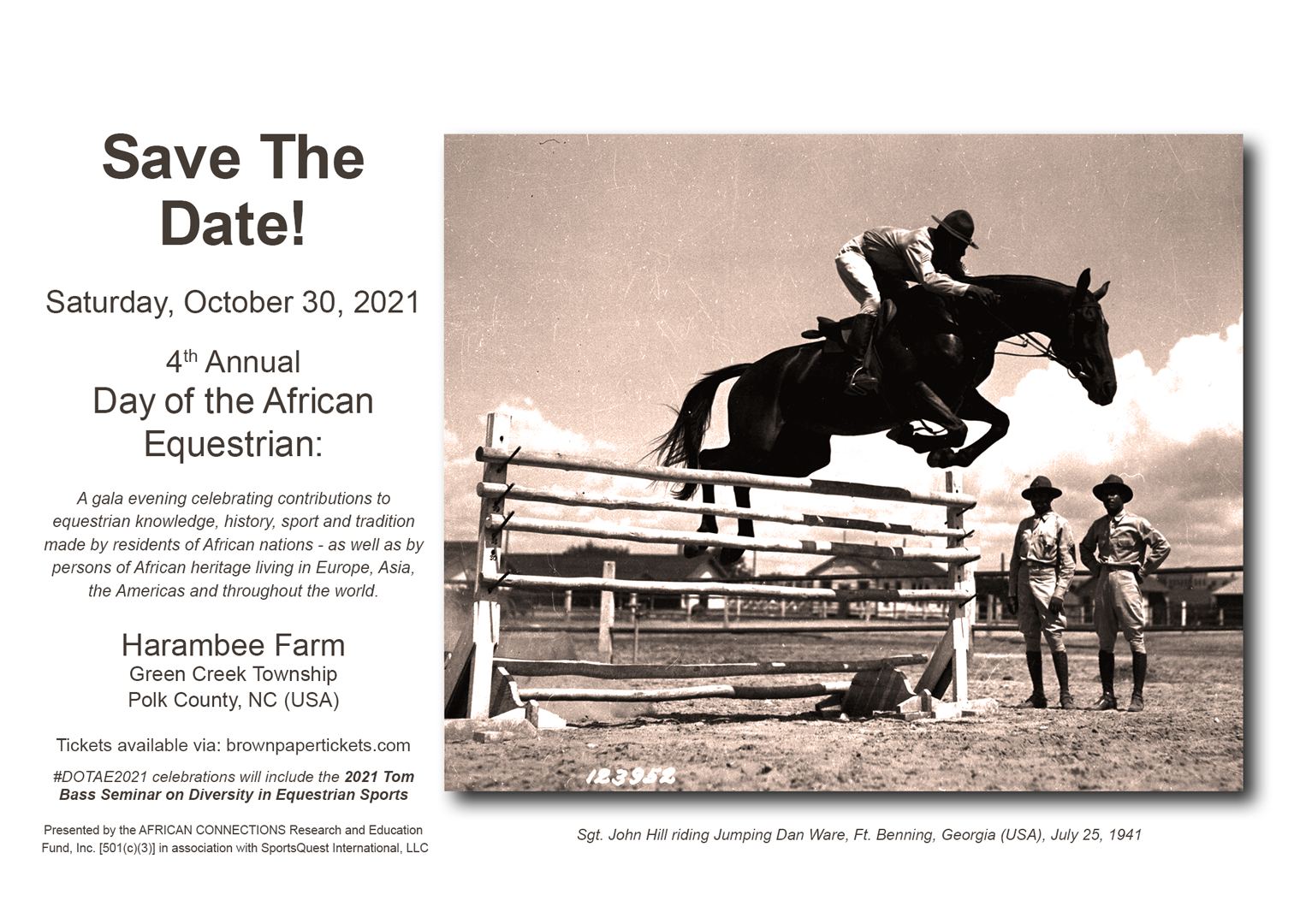
The 2020 Tom Bass Seminar on Diversity in Equestrian Sports will be presented via video conference on Saturday afternoon, November 14 from 3:30 p.m. Eastern Time (20:30:00 UTC). The virtual meeting will examine issues relating to diversity in a) domestic and b) international arenas. Registration for the seminar is now open here.
Launched in 2019 as part of the 2nd Annual Day of the African Equestrian (DOTAE), the 2020 seminar takes place against a backdrop of social and political turmoil in the United States – in a year where the equestrian community has been forced to reckon with many of its own contradictions and activist riders of color including Brianna Noble and The Compton Cowboys have achieved international notice – in part through the use of horses in public protests inspired by the global Black Lives Matter (BLM) movement.
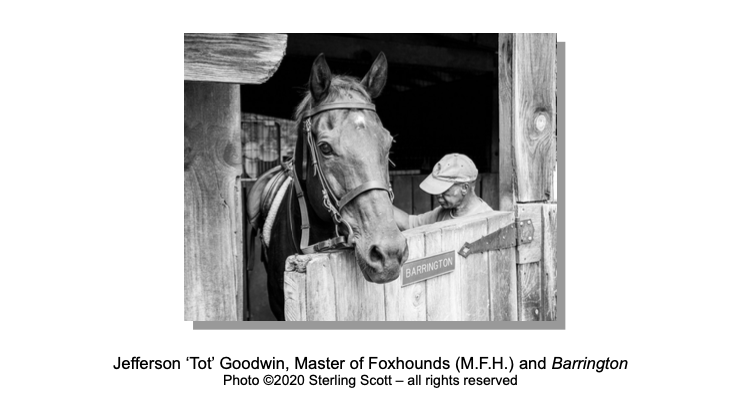
A legendary American Saddlebred trainer, Tom Bass (1859 – 1934) was born enslaved in Columbia, Missouri. He played a prominent role both in the establishment of the American Royal Horse Show in Kansas City and in the promotion of the city of Mexico, Missouri as the ‘Saddle Horse Capital of the World.’ Highlights of his extraordinary career include championships at two World’s Fairs and more than 2,000 blue ribbons. For many years he was the only African-American permitted to compete at the American Royal. The Tom Bass bit, developed to give the rider control without causing pain to the horse, is still in use today.
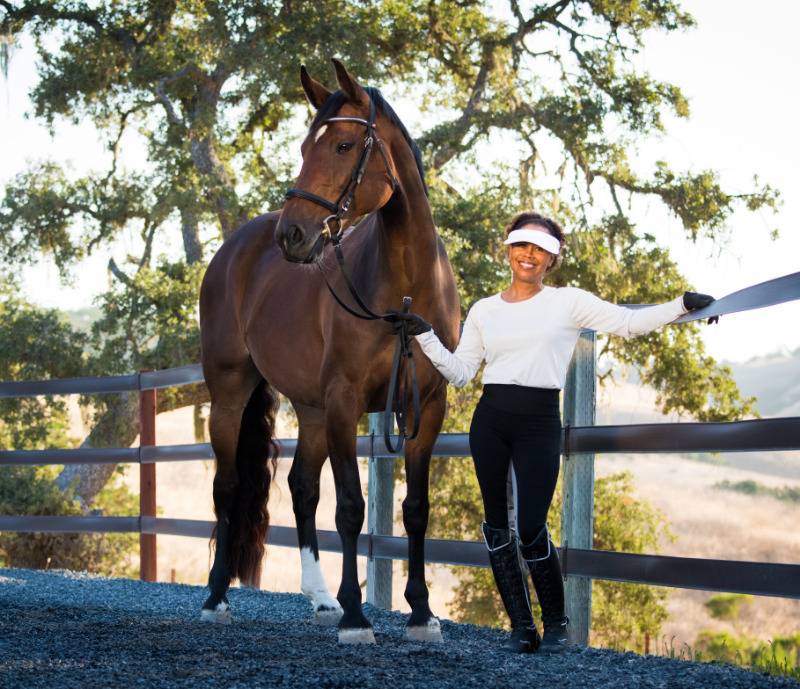 Donna Marie Cheek, the first African-American woman to ride for the USET.
Donna Marie Cheek, the first African-American woman to ride for the USET.
Image courtesy of Donna Marie Cheek
During his lifetime, Bass performed before such luminaries as Queen Marie of Romania, William Jennings Bryan, P.T. Barnum and U.S. Presidents Grover Cleveland, William McKinley, Theodore Roosevelt, William Howard Taft and Calvin Coolidge. His more prominent clients included Mr. Roosevelt, Buffalo Bill Cody, Anheuser-Busch executives Adolphus and August Busch and Will Rogers.
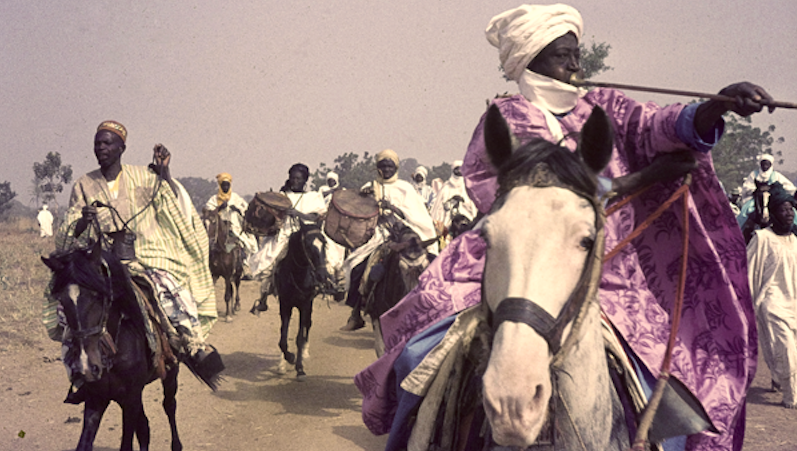 Horsemen in Northern Nigeria circa 1970
Horsemen in Northern Nigeria circa 1970
Topics to be explored during the 2020 Tom Bass Seminar on Diversity in Equestrian Sport include:
- Demystifying horse sport – not for rich kids only! Reviving equestrian heritage in lower and middle income communities
- Developing broad-based community support for equestrian activities at all levels
- Building sustainable programs that support diversity in the horse industry
- Incorporating the lessons gleaned from social activism into the ways in which we do business
- Leveraging (new and traditional) media in horse focused education and promotion
- Developing stories that more accurately reflect the life experiences of equestrians of color
- Incorporating the rich equestrian heritages of non-white, non-European communities (including African, African-American, Asian, Hispanic, Native-American, Romani, South Asian and others) into our shared equestrian narrative
The seminar is presented by The AFRICAN CONNECTIONS Research and Education Fund, Inc. in association with SportsQuest International, LLC.
Invited participants include officials of the Fédération Equestre Internationale (FEI) – the international governing body of equestrian sport; the United States Equestrian Federation (USEF); activist Brianna Noble; pioneering African-American showjumper Donna Marie Cheek; former Badminton Horse Trials Media Director Julian Seaman; Jamaican equestrian rider and coach, Julian Hyde; Equestrian Sports Productions, LLC President Michael Stone; Equidet (UK) founder Sandra Murphy; Alltech Account Manager Hillary Tucker; and representatives of China’s Heilan Equestrian Club. Invitations have also been extended to well-respected equine industry journalists including: Leslie Wylie, Martha Drum, Elizabeth Kaye McCall and Tori Repole.
Public Relations assistance and technical support will be provided by the Tryon International Equestrian Center (TIEC). Additional support is provided by EventingNation.com and its sister publications.
A world-class destination for everything equine, the Tryon International Equestrian Center played host to the FEI World Equestrian Games (the official world championships of equestrian sport) in September 2018. Linkage to the video conference will be available from the following websites:
- The African Connections Research and Education Fund, Inc. (www.africanconnections.com)
- SportsQuest International, LLC (www.SportsQuestInternational.com)
- Eventing Nation (www.eventingnation.com)
- HorsesDaily (www.horsesdaily.com)
- The Tryon International Equestrian Center and Resort (www.tryon.com)
Organizers of the Tom Bass Seminar point out that horses are big business in the United States and in many regions of the world.
According to the American Horse Council, the horse industry contributes approximately $50 billion in direct economic impact to the U.S. economy, supporting almost one million jobs on a full-time basis1. According to statistics presented at the 2013 FEI Sports Forum — held at the International Institute for Management Development (IMD) in Lausanne, Switzerland — the horse industry has a €100 billion ($128.151 billion) annual economic impact within the European Union. The economic impact in the United Kingdom is estimated at being over £7 billion ($10.643 billion)2.
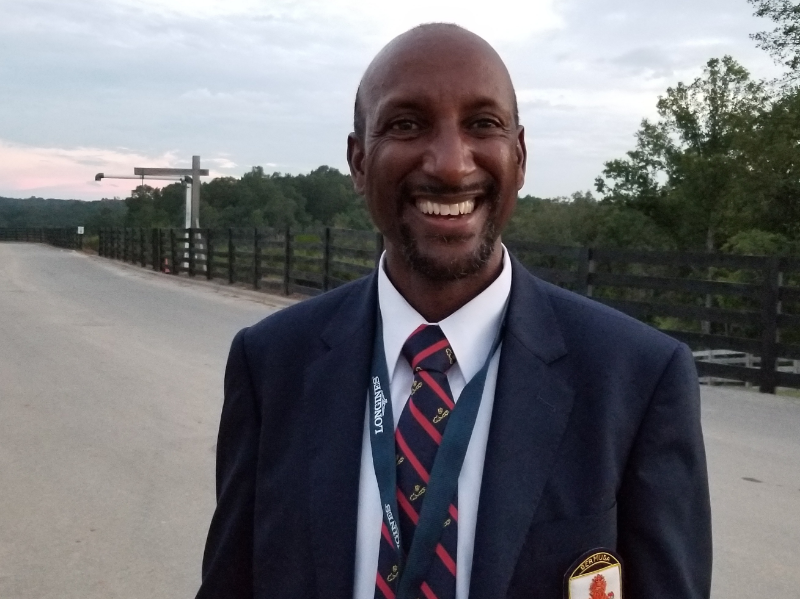 Marvin Brangman, who represented Bermuda in the 2018 WEG Endurance competition.
Marvin Brangman, who represented Bermuda in the 2018 WEG Endurance competition.
Photo courtesy of SportsQuest International, LLC.
A major challenge for an Olympic sport that promotes itself as being truly global, “clean” and fully inclusive, is a conspicuous lack of people of color. People of color are underrepresented in the ranks of riders, owners, trainers, breeders, veterinarians, farriers, nutritionists, sponsors, spectators and members of the equestrian media. Conversely, there is an overrepresentation as grooms, nannies, hot walkers and stall muckers.
To remedy this situation, equestrian sports promoters and organizations representing all facets of the industry are being urged to understand that it is good business to spend advertising dollars in minority communities. “Developing a more diverse fan base involves supporting equestrian sport training programs in those communities and working in concert with ethnic media outlets in educating members of the public about horse sport. Cultivating cooperative alliances with minority owned businesses will yield tangible benefits,” wrote seminar moderator Melvin Cox in a 2017 editorial published by HorseNation.com.
Mr. Cox, a Lecturer at the University of California, Santa Cruz is the Founder and Managing Director of SportsQuest International, LLC – a media production and consulting business focused on the equestrian industry. Mr. Cox foresees an explosion of interest in equestrian sports throughout the United States and in other countries — reaching across all socioeconomic strata. But, he warns, “the outreach to new market segments will have to be done correctly — from a position of true humility and respect, and not from one of blatant arrogance.”
“Much as motorsport has successfully built a loyal following among fans with little if any opportunity (or desire) to own a Formula One racing car,” wrote Cox, “the horse sports can be proactively marketed to all demographics. Just as Major League Baseball attracts millions who will never hit a curveball, the equestrian disciplines can find deeply loyal and very knowledgeable aficionados among persons representing all manner of humanity.”
The solution proposed by seminar organizers targets a more equitable distribution of the scholarships, internships, jobs, contracts, investment opportunities and profits associated with the global horse business. A key component of this effort is to increase awareness among young people in cities, suburbs and rural communities regarding the opportunities for successful and fulfilling careers available in the horse business. Cox believes that America’s Historically Black Colleges and Universities (HBCUs) and her Hispanic Serving Institutions (HSIs) represent an untapped “gold mine” of talent and opportunity.

